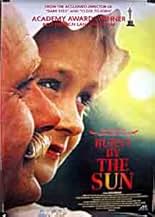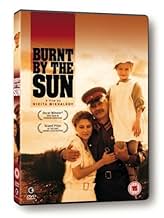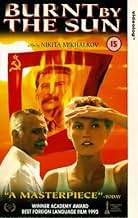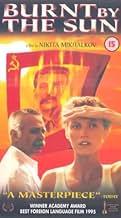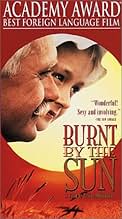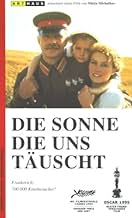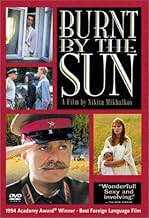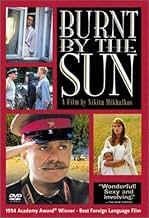ÉVALUATION IMDb
7,8/10
17 k
MA NOTE
L'été 1936 en URSS. Kotov, héros de la révolution bolchévique passe une journée de repos dans sa datcha avec sa femme Maroussia et leur fille Nadia. La révolution l'avait renvoyé loin et dép... Tout lireL'été 1936 en URSS. Kotov, héros de la révolution bolchévique passe une journée de repos dans sa datcha avec sa femme Maroussia et leur fille Nadia. La révolution l'avait renvoyé loin et dépouillé de tout. Les souvenirs ont un goût amer.L'été 1936 en URSS. Kotov, héros de la révolution bolchévique passe une journée de repos dans sa datcha avec sa femme Maroussia et leur fille Nadia. La révolution l'avait renvoyé loin et dépouillé de tout. Les souvenirs ont un goût amer.
- A remporté 1 oscar
- 4 victoires et 9 nominations au total
Ingeborga Dapkunaite
- Marusya
- (as Ingeborga Dapkunayte)
Nadezhda Mikhalkova
- Nadya
- (as Nadya Mikhalkova)
André Oumansky
- Filipp
- (as Andre Umanskiy)
Avis en vedette
This is an interestingly broken-backed film. Set during the Stalinist era during one idyllic summer, it begins by contrasting the lives of Dmitriy (Oleg Menshikov) and Sergey (Nikita Mikhailkov) - the one a dilettante musician and pianist, the other a colonel in the Russian army and favorite of the premier. They both have a claim on Marusya (Ingeborg Dapkunaite): Srgey is married to her, and Dmitriy was a former lover of hers. It seems that the film's moral scheme is relatively straightforward: Dmitriy is talented but feckless, while Sergey seems virtually untouchable - not only does he have a great career, but he is happily married as well. However director Mikhailkov turns the tables on our expectations and thereby transforms BURNT BY THE SUN into a penetrating analysis of how dictatorships corrupt everyone around them. Concepts of 'good' and 'evil# no longer prevail: everyone simply does what it takes in order to survive. The ending is both shocking yet predictable. Visually speaking, the film contrasts the idyllic surroundings of Dmitriy's dacha with the behavior of the protagonists - it seems that no one can actively enjoy the delights of glorious summer weather, for fear of being discovered. Life at that time must have been precarious, with no one actually being sure as to what would happen to them next. BURNT BY THE SUN is slow-moving, but Mikhailkov's camera has an eye for telling detail and significant gestures. Definitely worth watching.
"Burnt by the Sun" is a powerful example of what a genuinely Russian movie can be when it uses the good sides of western film-making : a coherent plot, professional camera work, and freedom of expression, all things that were rare for the cinema of Soviet times. Of course, it is not surprising that it was made by Nikita Mikhalkov, one of the few Russian directors who achieved lasting world success during communism, and therefore he had the right contacts abroad to get a decent budget. Though, "Burnt by the Sun" is way better than Mikhalkov's pompous "Barber of Siberia", which was alloted more money than any other film in the history of Russian cinema.
In "Burnt by the Sun", Mikhalkov was able to give us a palpable feeling of the beauty and genius of Russia. The lighting is magnificent all the way through, and the ripe and wide wheat fields shine like gold. The action takes place in a cozy dacha among the birch trees, a house which seems to be the nest of a bunch of gentle and carefree eccentrics, all in an atmosphere that reminds pleasantly of Tchekov.
Yet, you can tell from the start that "Burnt by the Sun" is not going to be just a comedy, as the first scene opens on a man cutting his veins in a bathtub while the telephone is ringing. However, this first forewarning soon gets forgotten throughout most of the film, which keeps a warm, light-hearted, slightly nostalgic tone almost all the time. It is only towards the middle you realize that it starts looming slowly towards predictable tragedy, and this only gets obvious in the very last moments.
It turns out that the characters we see are all members of an old aristocratic family who were spared the horrors of the revolution because the younger daughter, Marusia, married a Red Army colonel, much older than she is. Thus, they keep on living as they ever did, playing cards, drinking tea from samovars, making private jokes in French. They even have a maid and a parrot. They seem totally oblivious of the reality around them. Except for innocent looking balloons with Stalin's face on them and a few parading pioneers, the communist regime is visible almost only through the presence of colonel Kotov, brilliantly played here by Nikita Mikhalkov himself.
Colonel Kotov impersonates a character very familiar to the Russian mentality : he is tall, strong, authoritarian, but at the same time protective, warm-hearted, charming and prone to jokes. He is about just as sympathetic as the gruff milkman with a heart of gold in "Fiddler on the Roof". Although he is a military, he is not the kind of guy you think as having blood on his hands. But of course Lenin and Stalin's aura over Russian people was also partly due to the fact that they represented strong and protective father figures.
The story takes a sudden turn with the arrival of an enigmatic character disguised as a Santa Claus in the middle of summer. He turns out to be known by everyone in the house, as he is the adoptive child of the late grandfather. In fact, he was Marusia's childhood companion, and her lover in the first place, but was evicted by Kotov, who protected henceforth the whole family from repression. It soon becomes clear that the man, called Mitya, has come to take revenge for his shattered life.
All performances here are good, even though Nikita Mikhalkov, as an actor, still manages to steal the show. But one will not either forget the performance of his then six-year old daughter Nadya , who also plays his daughter in the movie. A charming, energetic and witty child performance which impersonates the innocence of the family about to be lost.
The French title for the movie was "Deceitful Sun", and I find it more appropriate. Although the film bathes in quiet sunlight, it deals with one of the darkest eras of Russian/Soviet history : Stalinism. In the early 1930's, Stalin decided to eliminate much of the newly arisen communist elite whom he did not trust anymore, and hired former enemies of communism, or half-criminals, to eradicate his own official allies. Thus, colonel Kotov remains self-righteous and sure of himself almost until the end because he simply cannot believe that Stalin will not protect him.
Needless to say that "Burnt by the Sun" is one of the first Russian movies that deals so openly with the subject. A subject which still remains quite sensitive since millions of people had their lives shattered by those events. Unlike what happened for Nazism, it was not until the end of the communist regime that it was possible to discuss it openly, even though Stalin's deeds had already been condemned officially a long time before. Therefore, this superb drama is also the symbol of a historical breakthrough.
In "Burnt by the Sun", Mikhalkov was able to give us a palpable feeling of the beauty and genius of Russia. The lighting is magnificent all the way through, and the ripe and wide wheat fields shine like gold. The action takes place in a cozy dacha among the birch trees, a house which seems to be the nest of a bunch of gentle and carefree eccentrics, all in an atmosphere that reminds pleasantly of Tchekov.
Yet, you can tell from the start that "Burnt by the Sun" is not going to be just a comedy, as the first scene opens on a man cutting his veins in a bathtub while the telephone is ringing. However, this first forewarning soon gets forgotten throughout most of the film, which keeps a warm, light-hearted, slightly nostalgic tone almost all the time. It is only towards the middle you realize that it starts looming slowly towards predictable tragedy, and this only gets obvious in the very last moments.
It turns out that the characters we see are all members of an old aristocratic family who were spared the horrors of the revolution because the younger daughter, Marusia, married a Red Army colonel, much older than she is. Thus, they keep on living as they ever did, playing cards, drinking tea from samovars, making private jokes in French. They even have a maid and a parrot. They seem totally oblivious of the reality around them. Except for innocent looking balloons with Stalin's face on them and a few parading pioneers, the communist regime is visible almost only through the presence of colonel Kotov, brilliantly played here by Nikita Mikhalkov himself.
Colonel Kotov impersonates a character very familiar to the Russian mentality : he is tall, strong, authoritarian, but at the same time protective, warm-hearted, charming and prone to jokes. He is about just as sympathetic as the gruff milkman with a heart of gold in "Fiddler on the Roof". Although he is a military, he is not the kind of guy you think as having blood on his hands. But of course Lenin and Stalin's aura over Russian people was also partly due to the fact that they represented strong and protective father figures.
The story takes a sudden turn with the arrival of an enigmatic character disguised as a Santa Claus in the middle of summer. He turns out to be known by everyone in the house, as he is the adoptive child of the late grandfather. In fact, he was Marusia's childhood companion, and her lover in the first place, but was evicted by Kotov, who protected henceforth the whole family from repression. It soon becomes clear that the man, called Mitya, has come to take revenge for his shattered life.
All performances here are good, even though Nikita Mikhalkov, as an actor, still manages to steal the show. But one will not either forget the performance of his then six-year old daughter Nadya , who also plays his daughter in the movie. A charming, energetic and witty child performance which impersonates the innocence of the family about to be lost.
The French title for the movie was "Deceitful Sun", and I find it more appropriate. Although the film bathes in quiet sunlight, it deals with one of the darkest eras of Russian/Soviet history : Stalinism. In the early 1930's, Stalin decided to eliminate much of the newly arisen communist elite whom he did not trust anymore, and hired former enemies of communism, or half-criminals, to eradicate his own official allies. Thus, colonel Kotov remains self-righteous and sure of himself almost until the end because he simply cannot believe that Stalin will not protect him.
Needless to say that "Burnt by the Sun" is one of the first Russian movies that deals so openly with the subject. A subject which still remains quite sensitive since millions of people had their lives shattered by those events. Unlike what happened for Nazism, it was not until the end of the communist regime that it was possible to discuss it openly, even though Stalin's deeds had already been condemned officially a long time before. Therefore, this superb drama is also the symbol of a historical breakthrough.
I just watched and loved this movie.
It originally portrays the contrast in character, personality, viewpoint, and the relative consequences of the Revolution upon two people -
a) Mitya, a handsome, charming, romantic, poetic, musical, child-loving man who before the movie began, lived in rural Russia, grew up with a girl who was 7 when he was conscripted into World War I, and deeply loved her parents, cousins, aunts, uncles and the household servants, and
b) Kotov, an older man, military, probably more courageous and less intelligent, bluff and physical, sentimental and less artistic, stronger but simpler, equally child-loving, from a poorer background.
Enemies in the Revolution, their behavior toward each other begins with cruelty by Kotov toward Mitya, Mitya's forced cruelty to others, and a changed and cruel man now (and knowing it) Mitya's cruelty to Kotov. And yes, a woman is also in the mix. The story is told as much through Kotov's eyes as through Mitya's.
And guess what? With all this cruelty, Kotov and Mitya are both people you'd love to spend the day with.
It's beautifully photographed - the same wonderful languor as watching say, Turgenev's A Month in the Country, the child is enchanting, the story is absolutely fascinating - far more original than such other "political" movies as The Conformist or The Garden of the Finzi-Continis. The movie is about social class, temperament, and how freely people make decisions in their lives, about love for the opposite sex, children, and country. It's compelling - you will truly always remember this movie.
It originally portrays the contrast in character, personality, viewpoint, and the relative consequences of the Revolution upon two people -
a) Mitya, a handsome, charming, romantic, poetic, musical, child-loving man who before the movie began, lived in rural Russia, grew up with a girl who was 7 when he was conscripted into World War I, and deeply loved her parents, cousins, aunts, uncles and the household servants, and
b) Kotov, an older man, military, probably more courageous and less intelligent, bluff and physical, sentimental and less artistic, stronger but simpler, equally child-loving, from a poorer background.
Enemies in the Revolution, their behavior toward each other begins with cruelty by Kotov toward Mitya, Mitya's forced cruelty to others, and a changed and cruel man now (and knowing it) Mitya's cruelty to Kotov. And yes, a woman is also in the mix. The story is told as much through Kotov's eyes as through Mitya's.
And guess what? With all this cruelty, Kotov and Mitya are both people you'd love to spend the day with.
It's beautifully photographed - the same wonderful languor as watching say, Turgenev's A Month in the Country, the child is enchanting, the story is absolutely fascinating - far more original than such other "political" movies as The Conformist or The Garden of the Finzi-Continis. The movie is about social class, temperament, and how freely people make decisions in their lives, about love for the opposite sex, children, and country. It's compelling - you will truly always remember this movie.
10Prozacc
Just saw this film as the closing class in my first term Russian language class. It's one of the ten best films I've ever seen. Our professor grew up in the Soviet Union and at the end (no spoilers, I promise) she had to leave because it was too familiar. I wasn't informed until afterwards that it was based on a true story, but it didn't matter. As I watched it I actually forgot that it was subtitled, and my memory of it now is as though it was in English. My point by saying that is that it was so real, so powerfully directed and acted, that the language barrier didn't matter one bit. Stunning film.
10Ed-90
Beautiful film, full of humanity and honest in ways sometimes jarring, but always right on target. A westerner gets a sense of the depth of love for mother Russia, as well as the difficulty many faced during the 1930's Stalinist years. The film is a winner, and worth seeing more than once. The performance by the little girl is incredible; I was taken by her talent and smarts. One of the best films I've seen this year. Thumbs up. Two thumbs up.
Le saviez-vous
- AnecdotesOne of four Russian films ever to win Academy Award for Best Foreign Language Film. The others are Voyna i mir (1965), Dersou Ouzala (1975) and Moskva slezam ne verit (1980)
- ConnexionsFeatured in Namedni 1961-2003: Nasha Era: Namedni 1995 (1999)
- Bandes originalesUtomlennoe solntse
Written by Jerzy Petersburski (as Ezhi Petersburgskiy)
Lyrics by Iosif Alvek (uncredited)
Performed by Mark Simkin (singer), Efim Vyshkin (violin), Aleksandr Bashkatov (bayan), and Viktor Agapov (guitar)
Played by an instrumental quartet during opening credits as a film's theme song
Meilleurs choix
Connectez-vous pour évaluer et surveiller les recommandations personnalisées
- How long is Burnt by the Sun?Propulsé par Alexa
Détails
- Date de sortie
- Pays d’origine
- Site officiel
- Langues
- Aussi connu sous le nom de
- Burnt by the Sun
- Lieux de tournage
- sociétés de production
- Consultez plus de crédits d'entreprise sur IMDbPro
Box-office
- Budget
- 2 800 000 $ US (estimation)
- Brut – États-Unis et Canada
- 2 302 338 $ US
- Fin de semaine d'ouverture – États-Unis et Canada
- 60 074 $ US
- 23 avr. 1995
- Brut – à l'échelle mondiale
- 2 313 461 $ US
- Durée2 heures 15 minutes
- Couleur
- Mixage
- Rapport de forme
- 1.66 : 1
Contribuer à cette page
Suggérer une modification ou ajouter du contenu manquant

Lacune principale
By what name was Soleil trompeur (1994) officially released in India in English?
Répondre

